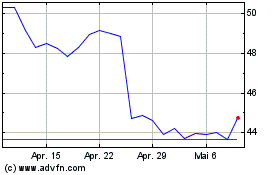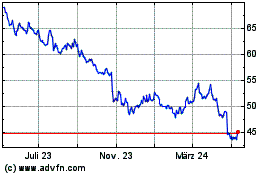Celgene, Bristol Clear Way For Merger -- WSJ
27 August 2019 - 9:02AM
Dow Jones News
By Jared S. Hopkins and Colin Kellaher
This article is being republished as part of our daily
reproduction of WSJ.com articles that also appeared in the U.S.
print edition of The Wall Street Journal (August 27, 2019).
Bristol-Myers Squibb Co. took a major step toward completing its
$74 billion acquisition of Celgene Corp., as the two pharmaceutical
companies found a buyer for a skin treatment whose sale they hope
will address antitrust concerns.
Amgen Inc. agreed on Monday to buy Celgene's psoriasis medicine
Otezla for $13.4 billion in cash. The decision comes after the U.S.
Federal Trade Commission raised anticompetitive concerns related to
anti-inflammatory drugs, of which Otezla is an example.
Bristol-Myers in January said it would acquire rival Celgene in
a deal knitting together two leading sellers in the $123 billion
world-wide market for cancer drugs. Shareholders signed off on the
deal in April after an unsuccessful activist campaign to derail the
merger.
New York-based Bristol pioneered the development of cancer drugs
known as immunotherapies, which unleash the body's immune system on
tumors. Summit, N.J.-based Celgene leads in the sale of treatments
for multiple myeloma. The two companies were estimated at the time
to have nearly $38 billion in combined annual sales.
Otezla sales totaled $1.6 billion last year. The drug is used to
treat forms of psoriasis, a skin disease in which an overreaction
by the immune system causes itchy rashes to form on the body.
Analysts were surprised by the FTC's concerns about competition
because Bristol doesn't currently sell psoriasis medicines, though
it does have an experimental drug for the disease in late-stage
trials.
Shareholders were cool on the Bristol-Celgene deal when it was
struck in January, and Bristol's stock is trading lower than
year-ago levels. Through Friday's close, shares were down about 10%
this year compared with a gain of about 14% for the S&P 500.
Shares of both Bristol and Celgene were up about 3% on Monday in
midmorning trading. Amgen's stock was up 2.5%.
There has been a flurry of mergers and acquisitions in health
care this year. In January, Eli Lilly & Co. said it would buy
Loxo Oncology Inc. for about $8 billion. In June, AbbVie Inc.
agreed to acquire Allergan PLC for about $63 billion. And in July,
Pfizer Inc. announced it would merge its division of off-patent
drugs with Mylan NV.
Bristol-Myers on Monday said the sale of Otezla to Amgen is
contingent on a consent decree with the FTC and completion of the
Celgene acquisition, which the company now expects to occur by the
end of the year.
Bristol-Myers initially said the Celgene acquisition would close
in the third quarter, but then U.S. regulators raised
anticompetitive concerns. In June, the companies said they would
shed Otezla to satisfy the concerns.
Analysts said at the time that the FTC action could indicate the
government was taking a stronger look at pharmaceutical-industry
mergers. Earlier this year, Roche Holding AG has said the FTC
requested additional information regarding its planned takeover of
Spark Therapeutics Inc.
Analysts at JP Morgan Chase said in a note to clients the Otezla
deal was "a clear positive" for Bristol-Myers and that there aren't
any additional FTC concerns on the horizon related to the merger
with Celgene. They wrote the price tag exceeded their own estimate
of $10 billion.
Still, challenges lie ahead for the combined company. Bristol
faces heavy competition from Merck & Co. for immunotherapy
sales, while Celgene's top-selling product, multiple myeloma
treatment Revlimid, is expected to lose U.S. patent protection in
the next several years.
Amgen, based in Thousand Oaks, Calif., said Otezla is a strong
strategic fit with its psoriasis and inflammation portfolio and it
expects at least low-double-digit sales growth for the drug, on
average, over the next five years. Amgen said the deal is worth
about $11.2 billion, net of anticipated future cash tax
benefits.
Amgen, which has been pressured recently by the introduction of
copycats to its white-blood-cell booster Neulasta and calcium
reducer Sensipar, said Otezla has exclusivity through at least 2028
in the U.S.
Bristol-Myers said it would use proceeds from the Otezla sale to
pare its debt, adding that it plans to focus near term on
maintaining strong investment-grade credit ratings and a ratio of
debt to earnings before interest, taxes, depreciation and
amortization of less than 1.5 by 2023.
The New York drugmaker also boosted an accelerated
share-repurchase program, planned for after the Celgene deal
closes, to $7 billion from $5 billion.
Write to Jared Hopkins at jared.hopkins@wsj.com and Colin
Kellaher at colin.kellaher@wsj.com
(END) Dow Jones Newswires
August 27, 2019 02:47 ET (06:47 GMT)
Copyright (c) 2019 Dow Jones & Company, Inc.
Bristol Myers Squibb (NYSE:BMY)
Historical Stock Chart
Von Mär 2024 bis Apr 2024

Bristol Myers Squibb (NYSE:BMY)
Historical Stock Chart
Von Apr 2023 bis Apr 2024
